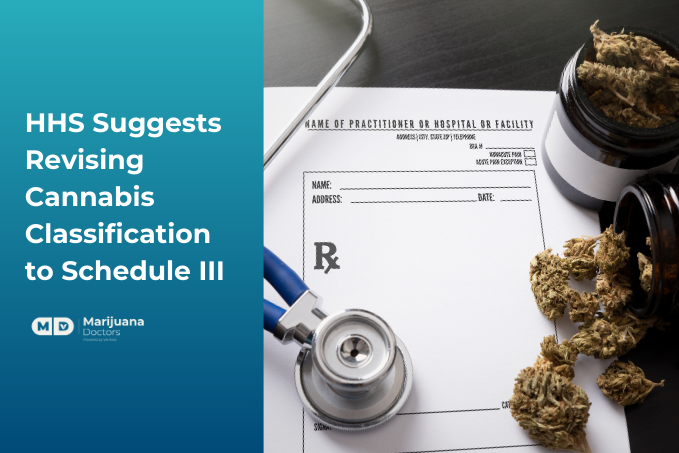
Did you hear? Cannabis may soon receive a new scheduling classification per the Controlled Substances Act. On August 29th, the U.S. Department of Health and Human Services (HHS) officially recommended that cannabis classification be rescheduled from a Schedule I drug to a Schedule III drug. This recommendation comes after the FDA completed an 11-month study into cannabis per the request of President Joe Biden.
A spokesperson for the HHS was quoted telling media, “Following the data and science, HHS has expeditiously responded to President Biden’s directive to HHS Secretary Becerra and provided its scheduling recommendation for marijuana to the DEA on August 29, 2023.”
“Schedule I drugs, substances, or chemicals are defined as drugs with no currently accepted medical use and a high potential for abuse.” Examples of Schedule 1 drugs include heroin, LSD, Oxycodone, and currently cannabis. Should cannabis be rescheduled as it is expected to be to a schedule III drug, it will join the ranks of non-narcotics and anabolic steroids. “Schedule III drugs, substances, or chemicals are defined as drugs with a moderate to low potential for physical and psychological dependence.”
Now, the ball is in the hands of the DEA. After a DEA review, a decision will be made as to whether or not cannabis will be rescheduled. To date, the DEA has historically followed the recommendations of departments within the HHS, including the FDA. Moving cannabis to a Schedule III listing would open doors for medical cannabis businesses and patients. For now, all eyes are on the DEA as we await their next move. Should the DEA follow the recommendations put forth to reschedule cannabis to a Schedule III classification, it would have many implications.
These implications wouldn’t so much affect the adult retail or recreational cannabis market but would bring about changes for the medical cannabis community and businesses. People have laid the foundation and the groundwork for a thriving legal cannabis industry.
Aaron Smith, CEO of the National Cannabis Association, told the media, “The vast majority of Americans live in states with laws that depart from federal law on this issue and where thousands of regulated Main Street businesses are serving the legal cannabis market safely and responsibly.”
The Congressional Research Service (CRS) was quoted by the media saying, “If marijuana is rescheduled to Schedule III, it would have broad implications for federal policy. Also, this move would have significant implications for state medical marijuana programs and users of medical marijuana, but fewer implications for state recreational marijuana programs and those who use marijuana recreationally.”
Should reclassification occur, cannabis businesses could see relief in the form of a break in taxes. Historically, cannabis businesses have been subject to Section 280E of the Internal Revenue Code, which prevents them from pursuing standard credits and deductions that other businesses have access to. Rescheduling would mean that cannabis businesses may be able to claim tax breaks like other legal businesses do in areas such as marketing expenses, rent, payroll, utilities, and more.
Research barriers surrounding cannabis are unparalleled. Should the DEA agree with the FDA and implement their recommendation, it would remove many barriers, allowing for more extensive research into the efficiency of cannabis for various therapeutic uses. It could also reduce criminal penalties for many cannabis-related violations, though those regulations would have to be defined at the state level. Luckily, in the majority of states within the U.S., states have already taken steps to do just that on their own.
Not everyone supports positive cannabis reform. According to an article in Forbes, “As the agency’s review of the HHS recommendation continues, members of Congress opposed to easing restrictions are calling on the DEA to maintain the status quo. In a letter sent to the agency on Monday, 14 GOP lawmakers urged the DEA to reject the rescheduling recommendation and maintain cannabis in Schedule I of the CSA.” Out with the OLD and in with the new. Americans are tired of political figures standing behind the misinformation about cannabis prohibition.
Is rescheduling the best move? It depends on who you ask. There are many who feel the only right step is to remove cannabis from the CSA entirely and to either not regulate it at all or to regulate it, similar to how alcohol and tobacco are regulated. This makes perfect sense, seeing how both of those substances are the cause of deaths on a daily basis while cannabis is saving lives and increasing the quality of many more. One thing is certain, and that is that rescheduling cannabis is definitely a step in the right direction and could have many positive effects.
No Information on MarijuanaDoctors.Com should be used to diagnose, treat, prevent or cure any disease or condition. You can view our Full Disclaimer here.